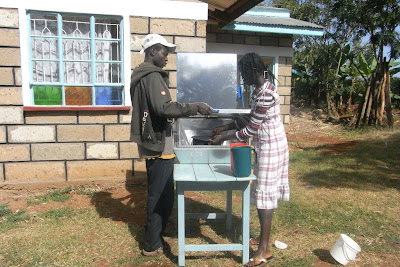Birthday Celebration of the Mount Kenya
Integrated Community Development Organization (MKICDO)
On my arrival in Gaketha I was welcomed by the members
of the Gaketha group. Singing and dancing they escorted me to Mugo´s home.
Representatives of other self-help groups and guests
of honor had come to celebrate with us the birthday of our newly founded Mount
Kenya Integrated Community Development Organization (MKICDO). Trees were
planted in Mugo´s compound and speeches given.
 |
| Anna Gatea of anamed plants a Moringa tree |
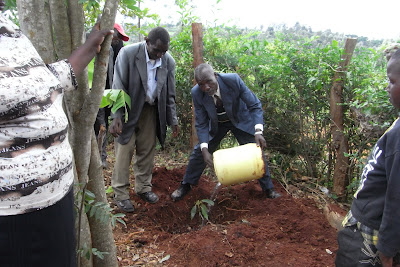 |
| the chairman of the Kaweru group in Kanyakine |
Then the guests were taken
around to see the various projects of the Gaketha group. Mugo had given part of
his land for a pilot project: a demonstration shamba for good farming practice.
They had dug terraces and planted different varieties of beans, sorghum, cassava
and Irish and sweet potatoes. Now they told their guests about the experiences
they had made.
 |
| tomatoes with napier grass planted along the contour lines |
 |
| the tree nursery |
The guests were also taken to the newly built
dispensary that will soon begin operating.
The Gaketha group has sold 1000 tree seedlings from
their tree nursery and planted them in the dispensary compound.
 |
| the dispensary |
The day ended with a birthday cake and a meal shared
by everybody.
Activities of the Gaketha Laura Energy Saving Group
The group had been active in their tree nursery and in
the pilot shamba. Some of the seeds and
cuttings they had planted in the shamba had been brought from the Kenya
Agricultural Research Institute (KARI) in Embu. The group wanted to find out
which variety would grow best at the altitude of 1600 metres in Gaketha.
Several varieties of sorghum had also been tried
out.
 |
| a two-season sorghum variety that brings good yields |
In the tree
nursery the group had begun to grow indigenous trees. Mr. Njue, their
experienced instructor, had collected them from the near-by Mount Kenya forest.
We always encourage people to plant indigenous trees and not just those that
grow fast and bring quick profit. Many people have been talked into growing
Eucalyptus trees as the electricity companies need poles for the wires. But
they are often not aware of the negative effects these trees have on the soil
and the ground water resources.
Once a month, the Gaketha group meets to do table banking. All members pay regular
contributions and are entitled to borrow money from the joint account. At the
following meeting the person pays back the amount plus a small interest. After
the table banking the group does the so-called merry-go-round. Each member contributes an agreed amount of money
and the total is handed over to one person.
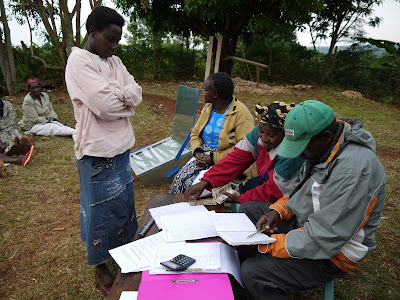 |
| All contributions are recorded in a book. |
 |
| The chairlady of the Gaketha group addresses the members. |
Group has so far bought 35 dairy goats for its members
and still wants to get more. With the donation money I brought they are
planning to buy a high-quality male goat to serve their females. They also want
to register with the goat breeders association.
 |
| dairy goats at a member´s home |
The group members also pay
regular contributions to buy water tanks for all of them. During my stay it was
another member´s turn. It was already the fourth tank they had bought and I was
invited to celebrate the occasion with them.
 |
| good food... |
 |
| ...and a happy song |
Visits to Self-Help Groups
Each board member of the Mount Kenya ICD Organization
is in charge of a different region where they monitor and support the
activities of several self-help groups. During my stay we visited some of the
groups to see their projects.
Some groups were started by people with disadvantages:
HIV-positive persons, AIDS orphans as well as their caretakers, widows and
physically and mentally handicapped persons.
In Igwajao we met the WENDO COMMUNITY EDUCATORS
SELF-HELP GROUP which had been initiated by Mugo´s sister-in-law Ivonne, a
retired nurse and a board member of our organization. It is a group of 26 community AIDS educators who
take care of 20 HIV-positive people, among them 10 orphans and disadvantaged
children. The group helps the sick in many ways and creates public awareness of
HIV/AIDS in the community. I was impressed how openly HIV-affected persons
confessed their illness. Some years ago there was still a tendency to suppress
the problem and hide from the public.
 |
| the Wendo group members receive donated food |
In nearby Kiarugu we visited the KAIRUTHI / MAARA
SELF-HELP GROUP. The women had built a kiosk in the village. Half of it was rented out; in the other half
they have a shop where they sell everyday goods. At the chairlady´s home I was
introduced to cereal banking: the
women store the beans each of them has harvested collectively in one member´s
home. Later, the beans can be sold at a profit or used for personal
consumption. This is also done with maize and other grains. The women keep
records of how much has been contributed and taken out.
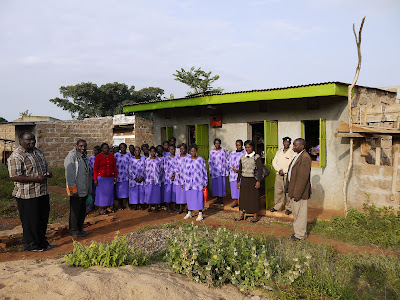 |
| the women in front of their kiosk |
 |
| preparing maize for storage: a lesson in cereal banking |
In Mitheru, not far from Mugo´s place, the THAGANIA
GROUP started a value-adding project.
They had been encouraged by the Ministry of Agriculture to grow soybeans and
process them into soymilk, flour, cakes and snacks. The day we visited, groups
from the ministry, the university in Nairobi and the non-governmental
organization Farm Concern International
had come to evaluate the project and give recommendations. The major problem
the group was facing was the lack of modern processing facilities and knowhow.
On our visits to self-help groups we often found that they had been encouraged
to start a certain project and that they had been given initial funding. Once
their activities had taken off they found themselves left alone with their
everyday-challenges. One of the major aims of our organization is to assist
such groups through education, information and networking and by linking them with experts who can
provide further training.
 |
| grinding soyabeans on a stone |
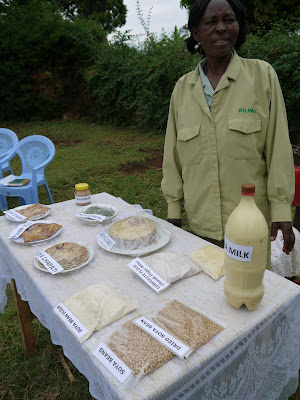 |
| soya products |
Another group that has started a value addition project is the KAWERU GROUP in Kanyakine. It is the
group of Reverend Nkanya, one of the board members of our organization. They
live in a banana-growing area and face stiff competition in marketing their
harvest. Bananas that are of sub-standard size don´t fetch a good price. The
group wants to find new marketing opportunities by drying surplus bananas,
making banana flour and a variety of banana snacks. On the day of our visit
they had also invited members of other groups in the area. The whole afternoon
they gave an impressive demonstration of their new skills and made the visitors
sample banana chips, porridge made with banana flour, deep-fried banana pieces
that had been dipped in dough and other tasty foods. The group still faces some
challenges. They need to buy better equipment and find ways to market their produce.
But they have made a good start.
 |
| frying banana chips |
After the practical part, Mugo displayed different
types of fuel-efficient stoves and a solar CooKit and Micheni talked about
natural medicine. Such events are always a good platform to pass on
information, to exchange experiences and ideas and to encourage other self-help
groups to start their own income-generating projects.
 |
| different stove designs |
In addition to the self-help projects I have described,
we visited many other groups. Christine, the secretary of the MKICDO board, has
started a group at Kabugua which takes care of people affected by AIDS. They
regularly meet at a clinic where they have laid out a sample kitchen garden.
They teach healthy nutrition and cook fresh vegetables on a fuel-efficient
stove.
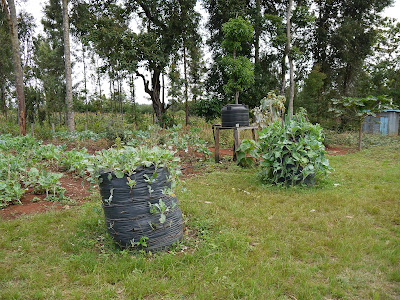 |
| container gardening |
The IRIGA
DISABLED VISION SELF-HELP GROUP has a poultry keeping project and a fish pond.
Near their tree nursery there is still a small indigenous forest. We urged
them to protect this valuable natural reserve and grow more indigenous trees in
their nursery.
 |
| tree nursery with indigenous forest in the background |
A group of orphans has started a youth group which has planted trees and built a fish pond. The money they make with their activities enables other orphans to take computer courses or go for further training activities.
 |
| at the fish pond |
The MITHERU BARAKA DISABLED GROUP keeps high-quality
dairy goats and rabbits and grows the feed for the animals in their nursery. The
government provided initial funding and sent experts for training.
One of Mugo´s teacher colleagues organized a group of
young school leavers. She allowed them to use part of her land where they now grow
vegetables and trees and keep chickens. This way they get a chance to acquire
practical skills before they go for further education.
A visit to
the Appropriate Technology Development
Centre (A.T.D.C.)in Siakago
We had been told that the A.T.D.C. had solar dryers on
display. Dryers are of great interest to groups that want to preserve surplus
fruits and vegetables. So Christine, Micheni and I drove to Siakago to learn more.
We were given a tour of the centre and saw a simple
box dryer, a cabinet dryer and a big greenhouse tent dryer. In the tent they
dried cassava which had been chopped in a manually operated machine designed
and manufactured at the centre.
We returned home with some good ideas for future
projects.
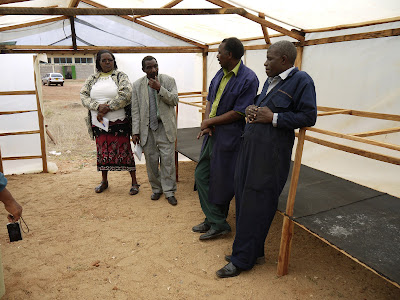 |
| inside a tent dryer |
|
|
|
 |
| a cassava grater - designed at the A.T.D.C. |
Murugi Youth Training Centre
On a Friday, some of our board members and I drove to
the Murugi
Youth Training Centre in Kianjagi near Chogoria. We met with the new
manager and members of the board of directors who are in charge of the centre.
The purpose of our visit was the introduction of our
new organization and the demonstration of the Lazola 3 solar box cooker which I had brought from Germany.
 |
| presentation of the Lazola 3 |
Our idea is to open a workshop at the centre
and train 3 or 4 skilled persons on the manufacture of the Lazola 3. The
initial training would be done by a German craftsman. The trainees will then
continue to manufacture box cookers for sale and train others who are
interested in acquiring the skills.
The Murugi Youth Training Centre is a
suitable institution for this project. New workshops are under construction and
the general infrastructure is good. They are already teaching various courses –
among others Home Economics. Teaching the basics of solar cooking could easily
be integrated into their existing syllabus.
 |
| the new training centre - view from the road |
 |
| at the back |
I explained our integrated approach of the joint use
of a solar cooker, a fuel wood-saving stove and a heat-retention basket cooker.
Our ideas were appreciated by the board members and the manager and they agreed
to support the Lazola 3 project.
Minugu
Primary School
Minugu Primary School is located in Muthenge,
about 2 km from Mugo´s home.
 |
| outside the classrooms |
 |
| teaching home economics |
The head teacher and other staff members have become
enthusiastic supporters of our environmental activities. They have
fuel-efficient stoves in their homes, use basket cookers and tell others about
them.
During my stay, an energy-saving stove was donated to the school and installed in the school
kitchen. The big launching ceremony was attended by the students and by parents
and members of the community. Teachers and guests of honor gave strong messages about the importance of protecting the environment.
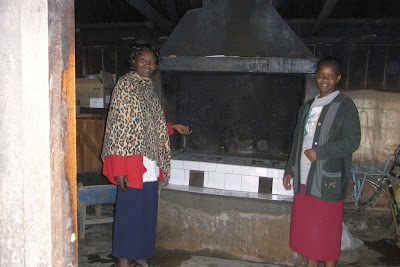 |
| the new stove |
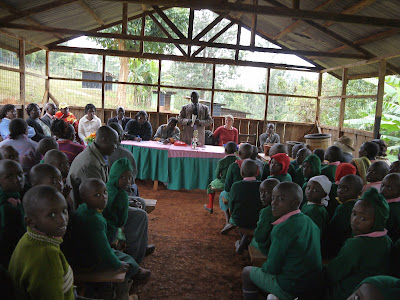 |
| the ceremony |
The school has also established a weekly environment
day. On Wednesday afternoons, the students take care of their vegetable gardens
and the trees they have planted all over the school compound. They got 1000
tree seedlings from the tree nursery of the Gaketha group. This year, the school
was rewarded a trophy for their outstanding efforts to protect the environment.
 |
| students taking care of their trees in the school compound |
 |
| the trophy in the head teacher´s office |
Environmental Concerns
excessive cutting of trees
 |
| an old Mango tree was cut down - the logs will be taken to the tea factory which uses huge amounts of fire wood |
 |
| this Mango tree is being chopped alive - for fire wood |
soil erosion
 |
| without proper terraces the soil is carried down the slopes and gullies are formed |
|
|
river encroachment
 |
| some farmers plant their crops closer to the river than allowed |

